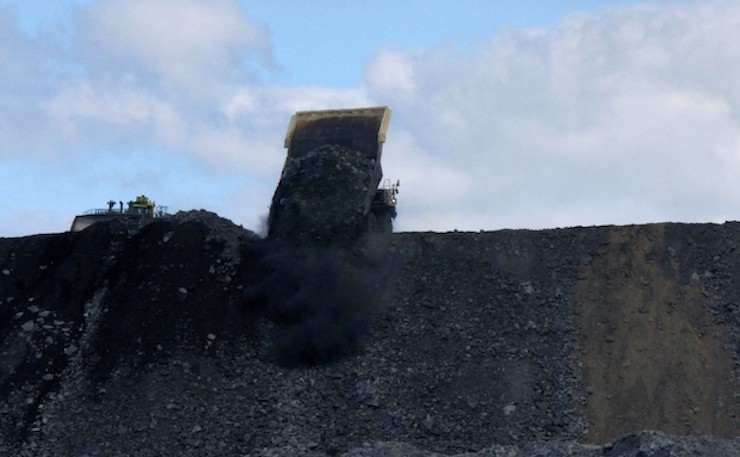The party is wedged on the issue, a divide manifest in the performance of two Ministers, writes Roger Scott.
Climate change and environmental management have been the great overlooked issue in this election campaign. Both have particular relevance in Queensland, where the ALP state government led by Annastacia Palaszczuk has given in-principle support to the Adani proposal for a massive coal mining development in northern Queensland.
The Palaszczuk government says its primary concern is to maximize employment. Facing the escalating consequences of the downturn in global demand for mining products, the government has opted to promote any perceived opportunities for new jobs, especially those located in the same areas where mining jobs have been lost and drawing on the same set of industry-specific skills.
Adani’s proponents successfully exaggerated the scale of employment opportunities until it was forced to come clean in court proceedings. (In a Brisbane Land Court hearing, an Adani representative conceded that the net job creation figure was closer to 1,400 than the 10,000 publicised in its public relations documents).
Despite it being a much smaller number than previously claimed, it was unarguable that there would be some permanent jobs created on the mine and other relatively small numbers, engaged for the construction stage and the associated port development. However, there was opposition from within the ALP as well as from the wider community.
Many remain concerned about Queensland’s major tourist and natural heritage asset, the Great Barrier Reef. Any port development linked by rail to the Adani mine will likely generate local pollution, land clearing around the site, and expose the reef to shipping mishaps. The consequences of this could be loss of employment in the Reef tourism sector resulting from the destruction of native species and diminished access to water supplies for sustaining agriculture.
Concern is also growing in relation to the requirement to extinguish native title to allow long-term certainty to the Adani developers, requiring negotiation with the holders of native title. Not all Indigenous leaders are supportive of the outcome of these negotiations.
Then there is the bigger concern around the impacts of this development: the burning of the coal that it will produce. The immediate climate change effects of ocean warming remain linked to fundamental damage to the Great Barrier Reef. The Australian Conservation Foundation has challenged Environment Minister Greg Hunt’s approval of Adani’s Carmichael coal project on this basis – that the approval of the massive pollution-producing coal mine is inconsistent with Australia’s international obligations to protect the World Heritage-listed Barrier Reef.
Within the ALP, inside and outside parliament, these various strands have come together to create two camps. Those in favour of Adani see the party’s future as requiring it to give priority to job creation and working-class interests, satisfying local union pressures and voter interests in seats where mining had once been a staple source of employment.
In factional terms, the pro-Adani sympathisers were found in the pro-business and often socially conservative elements in the party. The alternative Left faction’s influence has risen with the growth in party membership in response to Campbell Newman’s ultra-conservatism and increases in the Left’s parliamentary representation after the 2015 election which ejected him.
The continuing internal tension was personalised in the contrasting roles and speeches of the Queensland Minister for the Environment and Heritage Protection and the Minister for Natural Resources and Mines.
Dr Stephen Miles had a long-standing party affiliation and contact with the union movement; he held a PhD in industrial relation; he was a strong environmentalist and he campaigned under the slogan “Miles better for the Reef”; he went straight into a Cabinet post after the general election in 2015.
By contrast, the Minister for Natural Resources and Mines, Anthony Lynham was a doctor who had been a late entrant into political life in 2014 after a career as a maxillofacial surgeon. Driven by specific health-related issues, he stood in a crucial by-election and attracted the massive 19 per cent swing which heralded the threat to Newman’s supremacy. Lynham came into a Cabinet post after a short period as a Shadow Minister and proved adept at promoting the virtues of closer ALP collaboration with business and professional groups.
Both Miles and Lynham represent constituencies in Brisbane’s inner-west where polls show consistent support for environmental issues and for the Greens – both candidates received significant Green preferences in 2015. The opponents of Adani within the ALP focus on the danger of alienating peripheral party members to the point that their loyalties would transfer to the Greens. There was anecdotal evidence to suggest that this is already happening, just as there is evidence that bureaucrats within each of the departments headed by Miles and Lynham are antagonistic towards each other.
The agreed response of the Palaszczuk government has been to emphasise that maximum levels of constraint would be imposed on Adani to ensure adequate protection from the effects of the project, without diminishing overall commitment to its advancement. Adani’s opponents within the party have pursued the strategy of maximising the opportunities to delay any implementation, with the support of non-party environmentalist groups operating across a wide spectrum.
While broadly sympathetic to the aspirations of the Palaszczuk government and trade unionism, the weight of progressive opinion is that the longer-term deficits related to climate change significantly offset the short-term political advantages to be gained from being seen to support the Adani proposal.
Donate To New Matilda
New Matilda is a small, independent media outlet. We survive through reader contributions, and never losing a lawsuit. If you got something from this article, giving something back helps us to continue speaking truth to power. Every little bit counts.





